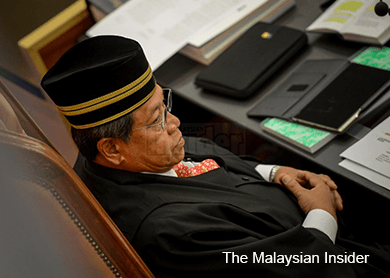
KUALA LUMPUR: Rigid house rules which restrict representatives from debating issues of public importance must be relaxed as a first step if Parliament is to be seen as independent and constitutional, according to several lawyers.
Parliament (Dewan Rakyat and Dewan Negara) is the highest and most appropriate forum to debate issues for public understanding, they said, pointing out that elected representatives to the Dewan Rakyat are weak, impotent and helpless in the face of executive power.
Senior lawyer Datuk Dominic Puthucheary said the Dewan Rakyat is perceived as a rubber stamp of the executive (the prime minister and his ministers) because the standing orders or house rules were amended to give overwhelming power to the Speaker.
He said if a constitutional democracy is to function, the Speaker must not only be independent but must also be seen to be independent.
“Let the House and public bear witness as to whether a motion is important. Only then can Parliament restore the respect it deserves from the people,” said Dominic, a former Member of Parliament (MP).
He said the Speaker’s continuous rejection of motions for debate, especially from opposition MPs, would eventually cause the decline of Parliament, adding that this is a way of curtailing freedom of speech.
Dominic was responding to Tan Sri Pandikar Amin Mulia’s offer to resign as Dewan Rakyat Speaker to overcome the public perception that Parliament is a rubber stamp to endorse the decisions of the executive.
Explaining why he retracted his resignation letter, Pandikar — who has been Speaker since 2008 — said he told Prime Minister Datuk Seri Najib Razak that he wanted reforms to be in place so the legislature would no longer appear as if it only acts on the government’s directive.
Lawyer Syahredzan Johan said Parliament has not been able to play an effective role in lawmaking, even with the increased number of opposition members and more vocal backbenchers.
“Laws presented by the government are still pushed through. In fact, we are seeing crucial bills such as the Peaceful Assembly Act, Prevention of Terrorism Act and amendments to the Sedition Act bulldozed through Parliament with unholy haste,” he said.
This, he said, occurs because of the whip system, especially on government backbenchers, who are forced to vote for a bill even though they might not agree with it or have reservations.
Second, he said, the whole house sat as a committee (after the first and second reading stages in Parliament). Syahredzan said in other jurisdictions, the bill would be referred to a smaller or select committee comprising government and opposition members who would go through it with a fine-tooth comb.
He said Parliament also acts as a check and balance to the executive, and the legislature fared better on this score.
Syahredzan, who is a member of the Malaysian Bar Council, said in other jurisdictions, there would be a parliamentary committee for each ministry which has powers to compel civil servants and others to come and explain the activities of the ministry.
The committee, he said, would also comprise government backbenchers and opposition MPs.
Lawyer Nizam Bashir said reforms should include making it mandatory for important bills to be given in advance for lawmakers to do their research.
“There cannot be quality debate if members of the house are given short notice of the bills that are introduced.”
Nizam also said a committee comprising veteran lawmakers, including those who have left office, should be formed to review the Standing Orders to regulate the affairs of the legislature and the conduct of members.
He said the legislature must be given the power to compel the presence of non-MPs when summoned to appear before Parliament on important matters.
Padang Serai MP N Surendran said the Barisan Nasional has never allowed Parliament to effectively exercise its constitutional role of scrutinising and criticising the government.
Surendran, who is also a lawyer, said no “Opposition Days” are allowed, a practice in which the opposition can move debates and motions to censure ministries. — The Malaysian Insider
This article first appeared in The Edge Financial Daily, on May 26, 2015.